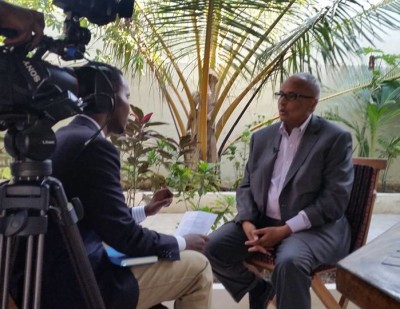
Muqdisho | August 22, 2016 – Somalia launched its foreign policy in 2015 defined by a strong case for territorial integrity. The policy, the government said would be pursued within the African integration process, in cooperation with its neighbors in East Africa, and as a member of the Intergovernmental Authority on Development (IGAD). Goobjoog News correspondent Ahmed Abdihadi this week sat with Foreign Affairs Minister Abdisalam Hadliye Omer to explore a range of topical issues.
Goobjoog News (GN): Somali citizens accused of involvement in piracy are facing charges and jail terms in Indian prisons. One of them died last year of TB and the Somali embassy there has been accused of neglecting the case. What action has your office taken on this matter?
Omer: We assigned this matter to lawyers; these lawyers will try to transfer prisoners to Somalia. In principle, Indian government is ready to do that. Now, they are under the Indian law, and we will see how we can help them. I know one person died and I sent my prayers to his family.
GN: Did you personally engage this matter?
Omer: Yes I did. When the deceased young man was ill, I tried to help him. The Indian government was aware before I engaged personally.
GN: Last week, you received the new American Ambassador to Somalia; let’s talk about the timing and significance of this reception.
Omer: America is super power country: it has the biggest economy, military and technology in the world. For a while our relations with America was not well matured; now that is not the case. This is success of this government. It’s the achievement of Somali president and Somali prime minister and all Somalis.
GN: When this government’s term was starting, Americans were keen to offer a lot of help and assistance but analysts say they got disappointed after they learnt that this government was less effective in dealing with pressing issues in the country. Did you get that impression from the new American ambassador?
Omer: It is not about impression, rather we talk about facts. Americans sent their ambassador to Somalia and we did the same, they train our military and they give aid to Somali people. They assist Somalia in all the sectors.
GN: If we compare the American and Turkish aid model, there seems to be discrepancies; The Turkish have built roads, airports and hospitals and also offer hundreds of scholarships to Somalis every year. Why do you think the Americans don’t do the same?
Omer: There are 250,000 Somalis in America, every year they send a lot of money back to country. Both of the countries are friends of Somalia.
GN: Somalia cut ties with Iran and expelled their diplomatic mission in Somalia because they had disputed with Saudi-Arabia. Was that based on a rational decision or pressure from the Saudis?
Omer: Iran was a threat to Somalia’s peace and stability. We do not want to undergo another religious fighting in the country. Saudi-Arabia is our friend, we have historic relations and when they need our help we will help them. Saudi Arabia is our biggest trading partner; it buys five million livestock from Somalia annually. Hundreds of thousands of Somalis live and work in Saudi-Arabia.
GN: Your government also threatened to cut ties with Sweden last year following a spat between Sweden and Saudi Arabia. Isn’t this indicative of Somalia’s submission to Saudi Arabia?
Omer: I am glad you have asked me that question. Sweden is a good country and that issue has been resolved.
GN: What is the status of the maritime case with Kenya and the government’s opinion on Kenya’s spirited efforts to settle this matter out of court?
Omer: A new hearing will be held on September 19-20th this year and God willing we will win in this case. We will only stick to the court process, no other means.
.
.
.
Sources: Goobjoog News
_______________________
_____________________________________________________________________________________
Xafiiska Wararka Qaranimo Online | Mogadishu, Somalia
_____________________________________________________________________________________Advertisement
_____________________________________________________________________________________







